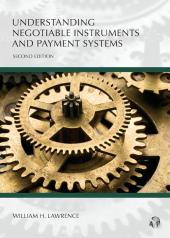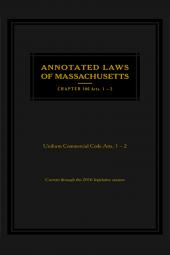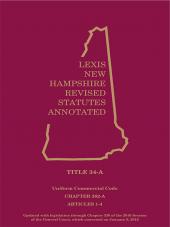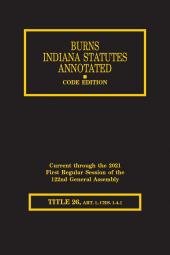Understanding Negotiable Instruments and Payment Systems
Select subscription type
Terms & conditions
Subscribers receive the product(s) listed on the Order Form and any Updates made available during the annual subscription period. Shipping and handling fees are not included in the annual price.
Subscribers are advised of the number of Updates that were made to the particular publication the prior year. The number of Updates may vary due to developments in the law and other publishing issues, but subscribers may use this as a rough estimate of future shipments. Subscribers may call Customer Support at 800-833-9844 for additional information.
Subscribers may cancel this subscription by: calling Customer Support at 800-833-9844; emailing customer.support@lexisnexis.com; or returning the invoice marked "CANCEL".
If subscribers cancel within 30 days after the product is ordered or received and return the product at their expense, then they will receive a full credit of the price for the annual subscription.
If subscribers cancel between 31 and 60 days after the invoice date and return the product at their expense, then they will receive a 5/6th credit of the price for the annual subscription. No credit will be given for cancellations more than 60 days after the invoice date. To receive any credit, subscriber must return all product(s) shipped during the year at their expense within the applicable cancellation period listed above.
Subscribers receive the product(s) listed on the Order Form and any Updates made available during the annual subscription period. Shipping and handling fees are not included in the annual price.
Subscribers are advised of the number of Updates that were made to the particular publication the prior year. The number of Updates may vary due to developments in the law and other publishing issues, but subscribers may use this as a rough estimate of future shipments. Subscribers may call Customer Support at 800-833-9844 for additional information.
Subscribers may cancel this subscription by: calling Customer Support at 800-833-9844; emailing customer.support@lexisnexis.com; or returning the invoice marked 'CANCEL'.
If subscribers cancel within 30 days after the product is ordered or received and return the product at their expense, then they will receive a full credit of the price for the annual subscription.
If subscribers cancel between 31 and 60 days after the invoice date and return the product at their expense, then they will receive a 5/6th credit of the price for the annual subscription. No credit will be given for cancellations more than 60 days after the invoice date. To receive any credit, subscriber must return all product(s) shipped during the year at their expense within the applicable cancellation period listed above.
Product description
View a sample of this title using the ReadNow feature
To purchase a printed version of this title, please visit www.caplaw.com.
This Understanding treatise provides a comprehensive treatment of the subject matter covered by Articles 3, 4 & 4A of the Uniform Commercial Code and by relevant provisions of the Truth in Lending Act, and Fair Credit Billing Act, the Electronic Fund Transfer Act, and Regulations E, J, Z, and CC. A primary focus is directed toward the law of negotiable instruments and of bank deposits and collections. The author also address the existing legal regimes that govern payments made in all forms, including checks and other drafts, cash, credit card, automated clearinghouses, automated teller machines, debit cards, and wholesale fund transfer.
Areas of coverage added to the second edition of the book includec hanges to the prior promulgation of Articles 3 and 4; revisions to Article 1; changes in check collection related to depository-bank check truncation; enhanced federal regulation of payment systems to assist in the detection of money laundering; regulation of debit cards, prepaid cards, mobile wallets, mobile payments, P2P, and crypto-currencies; and letters of credit.
epub is protected by Adobe DRM.
eBooks, CDs, downloadable content, and software purchases are noncancelable, nonrefundable and nonreturnable. Click here for more information about LexisNexis eBooks. The eBook versions of this title may feature links to Lexis+® for further legal research options. A valid subscription to Lexis+® is required to access this content.
Table of contents
Chapter 1: Introduction to Instruments
1.01 Distinguishing Instruments from Other Personal Property
1.02 Scope -- 3-102
1.03 Historical Context
Chapter 2: Negotiability
2.01 Relevance of Negotiability
2.02 Requisites of Negotiability - 3-104(a)
2.03 Types of Negotiable Instruments - 3-104
Chapter 3: Transfer and Negotiation
3.01 Overview
3.02 Transfer by Assignment
3.03 Transfer of an Instrument
3.04 Negotiation of an Instrument
3.05 Person Entitled to Enforce Instrument - 3-301
3.06 Issue - 3-105
Chapter 4: Contract Obligations
4.01 Liability on the Instrument – Fundamentals - 3-401
4.02 The Contracts
4.03 Disclaimer of Contract Liability
4.04 Surety Liability on the Instrument 3-419
4.05 Authority to Sign
4.06 Enforcement of Lost, Destroyed, or Stolen Instruments - 3-309
Chapter 5: Satisfying the Conditions of Contractual Liability
5.01 Introduction
5.02 The Conditions
5.03 Time Requirements
5.04 Consequences of Failure to Satisfy the Conditions
5.05 Excused Presentment and Notice of Dishonor - 3-504
Chapter 6: Holder in Due Course
6.01 Requirements to Qualify - 3-202(a)
6.02 Rights of Holder in Due Course
6.03 Absence of any Holder-in-Due-Course Rights
6.04 Negotiations That May be Rescinded - 3-202
6.05 Procedural Aspects - 3-308
6.06 Holders in Due Course and Consumers
Chapter 7: Discharge
7.01 Introduction
7.02 Liability on the Instrument
7.03 Liability on the Underlying Transaction
Chapter 8: Warranty Liability
8.01 Overview
8.02 Organization of Warranty Provisions
8.03 Transfer Warranties - 3-416, 4-207
8.04 Presentment Warranties - 3-417, 4-208
8.05 Breach of Warranties - 3-416(b), 3-417(b)
Chapter 9: Prevention of Unjust Enrichment
9.01 Restitution: Recovery of Payment Made by Mistake
9.02 Subrogation: Recovery by Assertion of Rights of Others
Chapter 10: Tort Concepts
10.01 Introduction
10.02 Negligence
10.03 Strict Liability
10.04 Conversion - 3-420
Chapter 11: Check Collection and Payment
11.01 Overview
11.02 Forward Collection
11.03 Payor Banks
11.04 The Return Process
Chapter 12: Relationship Between A Payor Bank and its Customer
12.01 Introduction
12.02 Contractual Basis of the Relationship
12.03 Wrongful Dishonor - 4-402
12.04 Customer’s Right to Stop Payment - 4-403
12.05 Stale Checks - 4-404
12.06 Customer Death or Incompetence - 4-405
Chapter 13: Payment by Cash
13.01 Development of the Concept of Cash
13.02 Legal Tender
13.03 Free Transferability of Cash
13.04 Allocation of Loss
Chapter 14: Payment by Credit Card
14.01 Relationship of the Participants
14.02 Federal Legislation
Chapter 15: Electronic Fund Transfers
15.01 The Systems
15.02 The Electronic Fund Transfer Act and Regulation E
15.03 Operating Rules and Regulation J
15.04 Article 4A of the U.C.C.
Table of Cases
Table of Statutes
Index
 Lexis Nexis
Lexis Nexis 



